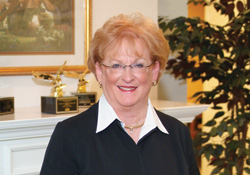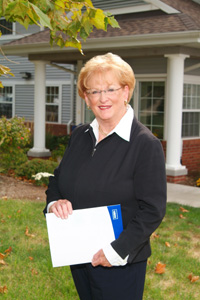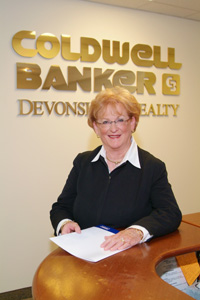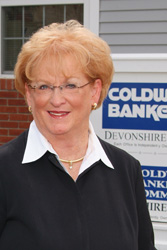
Koch left her position at Sears to raise her two children and got involved in the real estate business part-time while they were still young. When her children were older, she took a real estate licensing class and began her career as a Realtor with Gwen Phillips and Associates in Morton. “The rest,” she says, “is history.”
This Bradley University graduate became involved in the real estate business through her husband, a former Realtor and current professor at Illinois Central College. Koch enjoys educating new and aspiring real estate agents and keeping her agents informed of important changes to relevant laws.
When not working as a Realtor, Koch serves the community in numerous organizations. She is on the board of the Peoria Area Association of Realtors and volunteers with the Children’s Hospital of Illinois, the American Cancer Society and Race for the Cure. She is also a member of the Morton and Peoria Area Chambers of Commerce.
Tell us about your career path and the scope of your current position at Coldwell Banker Devonshire Realty.
I joined Coldwell Banker Preferred Realty in 1996. One of my first assignments was to evaluate the East Peoria office. After several months, I recommended consolidating that office with the Peoria and Morton offices. In 1998, Ron Hardgrove asked me to supervise the Pekin office for Coldwell Banker, and I also became a co-sales manager at the old Willow Knolls office. In 1999, when Tom Harrington purchased Coldwell Banker Preferred, Prudential Cullinan and Century 21 Halstead and Wolfe in Pekin, I was asked to coordinate the merger of the three offices. I managed the Pekin office, which became the number one office for three years. John Schumacher, president of Coldwell Banker Devonshire, then asked me to become the managing broker for both Pekin and Peoria in the Peoria office at 3300 W. Willow Knolls. I began mentoring a potential manager for the Pekin office while managing both offices for two years. I have managed the Peoria office for the past three years, during which my responsibilities included being a mentor and regional manager for the local offices of CBDR.
When your children were young, how did you juggle your role as a mom with your career?
During my first years of selling real estate, I only worked part-time. In 1987, my son was in fourth grade and my daughter was in seventh, so I decided to work full-time for Gwen Phillips and Associates in Morton. After receiving my broker’s license, I became manager of this office.
Because I was working in Morton, it was convenient if I needed to pick my children up from school or take them to sporting events, dance classes or orthodontist appointments. I always made a point to be home when they came home from school, even if I had appointments later in the evening. I tried to involve my children in my career by having them help me whenever possible. My husband was, and always has been, very supportive of my career, which allowed me to work the odd hours required of Realtors.
You were recently named 2007’s Illinois Realtor of the Year. How has this impacted your career?
As I was waiting to give my reports to the board of directors at the IAR business meetings in March, they announced this amazing honor. I was stunned and very humbled by the news. Personally, it has been a joy to be congratulated by so many friends, relatives, peers and current and past clients throughout the state.
I had been involved in the Illinois Real Estate Educational Foundation (REEF) for about six years, two of which I served as president of the foundation. It was a very rewarding experience to meet college students who are focused on career paths in real estate-related fields. We awarded many scholarships to these students, including several minority scholarships.
The impact this honor has had on my career has been exciting and rewarding. I truly feel I have gained much more than I have given over the years.
What is the most difficult part of your job? The easiest?
The easiest part of my job is working with the great agents and staff at CBDR. We work together as a family and I am proud of the way everyone helps each other. Training new agents who respond and succeed is also very rewarding.
Having to fire staff and agents who are not performing to their ability has to be the most difficult part of my job.
 How has the Peoria area real estate market changed since you began your career? How has the industry changed overall?
How has the Peoria area real estate market changed since you began your career? How has the industry changed overall?
There have been many changes in the real estate market since I began my career in 1981. The most notable is the introduction of the Internet, the electronic key box system, cell phones, faxes, scanners and the four-page sales contract (and two to five pages of addenda) we currently use to record offers on homes. When I began to sell real estate, all offices shared information through the Multiple Listing Service of the Peoria Area Association of Realtors by printing small sheets of paper with home information on them, and we used single-page contracts to purchase. My first cell phone was a “bag phone” which was heavy and awkward. We also relied on MLS books which were printed every two weeks. We had to go from office to office to pick up keys and information sheets.
Today, we no longer have MLS books, as we rely completely on the MLS system online. The consumer has access to much more data through real estate web pages as well. This helps Realtors know clients’ wants and needs. Before the Internet, I may have shown a buyer 20 to 35 houses before we found one they liked. Today, clients check properties out on the Internet and come to us with five to 10 houses they want to see. Most of the time they end up buying one of these houses as they have already had an opportunity to review the neighborhood, details of the homes, including photos, and the values of similar homes.
Electronic key boxes have also changed our industry in that we no longer have to deal with physical keys and the hassles of picking them up and dropping them off. Every member of the Peoria Area Association of Realtors has an electronic keypad which must be updated via a land-line phone every night. This offers greater protection for sellers because we can always check our assigned lockboxes to see who has entered properties. Another advantage of key boxes is that they do not work between 11 p.m. and 7 a.m., giving sellers more security when listing their homes for sale with a Realtor.
What inspired you to become involved in educating future real estate agents? How has your involvement in this affected your career?
When I was working for Gwen Phillips, she had always been a strong proponent of real estate education. She encouraged me to obtain my pre-license instructor license, which enabled me to teach classes of potential agents. This has always been very rewarding, as it keeps me up-to-date on license law, real estate law and the basic rules and regulations of our profession. It keeps me on my toes and helps me answer questions of agents who have problems with transactions. I still teach the pre-licensing classes and really enjoy seeing former students who have become successful in the real estate profession.
When I became an officer for the Peoria Area Association of Realtors, I began my involvement with the Illinois Association of Realtors. Education and professional standards were my natural choices for involvement, as I have always loved learning and feel it improves my ability to list, sell and assist agents through any real estate transaction.
I was president of the PAAR from 1996 to 1997, which involved a lot of travel to state and national meetings, providing another avenue for learning and advancing my professional career. Getting involved at these levels also brings new friendships throughout the state and the nation. I know someone who can be a good resource almost anywhere an agent needs to send a referral. In turn, we receive referrals to the Peoria area. These friendships also provide a resource whenever I need to discuss a new idea or want to talk about how other offices handle specific situations.
Finally, my most current responsibility at the Illinois Association of Realtors is completing my second year as dean of the Realtors’ Institute. This is an educational program sponsored by IAR whereby Realtors come together in late November and early February to spend four days of educational training from nationally- known instructors. It furthers Realtors’ education, and after three courses, a Realtor earns the designation of GRI (Graduate, Realtors’ Institute). This designation shows their choice to increase their knowledge of the industry and gain further education. Again, this has been a very rewarding experience for me, and I have made many friends through the GRI program.
 What qualities do you feel make for a good Realtor?
What qualities do you feel make for a good Realtor?
I believe a good leader is a person who can make decisions, listens carefully to the needs of his or her associates and has a strong knowledge of the profession. I believe a leader must have a vision and a strong sense of the ultimate goals to be achieved. A leader respects people they work with and sets an example of professionalism and ethical behavior.
It seems many people want to get a Realtor’s license because they may believe it is easy work and/or easy money. How do you advise those entering the career?
I advise anyone wanting to begin a career in real estate to have at least six months of savings before they start, as it often takes several months to generate enough income to survive. It is a very rewarding career, as we assist people in making one of the most expensive purchases of their lives. Homeownership is truly the American dream. The potential for income is unlimited in this business. However, I always tell people considering a real estate career that the harder they work, the more income they will generate. It is not an easy profession, as the hours are very unpredictable, which can be stressful at times when problems arise with buyers, sellers, appraisals or inspections. Our job involves much more than showing pretty houses and going to a closing. We are involved in every detail of the transaction except for giving legal advice.
A Realtor needs to be a self-starter and must enjoy people. It is truly a people business and probably one of the most rewarding, but also, most challenging. We must have a good working knowledge of our contracts, rules and regulations of the industry and, most of all, be proficient in providing outstanding customer service and effective negotiating for our clients.
What methods do you use to effectively manage more than 60 people?
I try to have personal contact with each agent or staff person at least several times a week. As a company, we have certain standards that we expect, and I have standards that I expect people to maintain within our office. I think that living these standards myself is the best example for the people that I work with. Everyone knows that I am available at least by phone anytime they have a problem. My phone rings morning, noon and night, and weekends too. I always tell the agents that I would rather they call me with a question rather than having to correct a major problem later on in a transaction. Keeping communication open is extremely important in our business. I use email, voice mail and weekly sales meetings to inform agents and staff of new issues in the real estate industry or company decisions or events.
What is the best networking tool you’ve found?
The best networking tool that I have found is to be involved and attend as many local and state functions as possible. My best networking occurs at PAAR, Chamber of Commerce, IAR and local civic events.
Actually, a funny story about networking is when I went grocery shopping when my children were still at home, I always came home much later than my family expected. They often teased that they were going to send the police looking for me. In truth I did a lot of networking in the grocery store aisles, as I always ran into people who wanted to talk about real estate. So, two hours later, I would walk in the door and have to explain that I saw so many people and just had to visit with them. Handing out my business card to anyone and everyone has also been very an effective prospecting tool for me. Communicating with people is another key…
Do you have any tips for homeowners or those looking to become homeowners?
My first advice is to always use a Realtor. Secondly, be sure to get pre-approved by a lender with a payment amount you are comfortable with. Many buyers can qualify for a larger loan than they want to spend. The monthly payment is the most important criteria. Always have a home inspection—even if the home you are purchasing is a new construction. “Location, location, location” is also good advice, and it is different for each buyer. Location and condition of a home are extremely important for re-sale. Finally, purchase the home that fits your needs, not anyone else’s.
What are the most popular amenities your clients look for in a home? Has this changed over time?
Granite countertops, large master bathrooms, ceramic or hardwood flooring, great rooms or open kitchen/family room combinations and three-car garages.
Yes, over the years, granite has become affordable, and hardwood floors have made the full circle from being “out-dated” to updated. Of course, even 15 years ago, three-car garages were almost unheard of, and now they are quite common in newer homes.
Tell us about your involvement in the community. Do you find that this helps you be a better Realtor?
Being involved in the community always makes us better people and, in turn, better Realtors. Over the years, I have been involved in the Chamber of Commerce in Morton and Peoria, St. Jude Children’s Research Hospital, the Children’s Hospital of Illinois telethon, Race Relations Committee for the City of Peoria, American Cancer Society chair and co-chair for Morton, the Morton Community Foundation, Counseling and Family Services of Peoria and the Illinois Central College Real Estate Advisory Council. I have been very involved in my churches over the years, from teaching Sunday school, children’s church and vacation Bible school to coordinating the Pioneer Girl program and chairing the Personnel Committee for several years.
 What is one thing people don’t know about the real estate business but should?
What is one thing people don’t know about the real estate business but should?
Many people do not know the complexity of a real estate transaction and the many details that Realtors must coordinate to bring transactions to closings. Also, I don’t think the public knows how much continuing education we must complete before renewing our licenses every two years. Real estate is an expensive business to be in, as it is one of the few industries which requires a professional to spend a lot of money marketing a listing and paying MLS and Association fees, as well as those of continuing education classes with no return on the investment unless a property sells. Most professionals are paid on an hourly basis, but Realtors only get paid when a transaction closes.
What industry trends do you foresee in the future?
I see more involvement with online services, such as transaction management, whereby the agent and the consumer can go online and check every step of their transaction. The industry is seeing more and more agents working from home. We all thought the Internet was going to change the need for person-to-person contact with Realtors, but it has instead created more informed consumers who recognize the need to have a professional assist them with their real estate purchases.
How has the Peoria area been impacted by the current problems with subprime loans? How do you see this issue trending?
The current real estate market in Peoria is in one of the top three years ever for sales. We have not been impacted by subprime lending or “no interest” loans like the west coast and Florida markets. Buyers who took out “interest only” loans were counting on the double digit inflation to create equity when they sold their properties. The Peoria area has experienced reasonable inflation, not the double-digit inflation of some of the other areas of the country. Total sales to subprime borrowers according to Illinois Association of Realtors statistics is less than two percent of all buyers. We are back to the basics of lending in that if a buyer has a job, a decent credit score and money for a down payment, the interest rates are excellent. FHA loans which used to be our primary source for lending to first-time buyers or buyers with limited down payments are becoming popular again because they will lend up to 97 percent of the value of the home, and the borrower has the opportunity to add some of the loan costs into the mortgage amount.
FHASecure is a program being offered to borrowers that are at risk of losing their homes because of some of the abuses in the subprime market. Realtors have been advocating for FHA reforms since the beginning of 2007. We continue to push for more FHA reform which would increase the FHA loan limits. Again, the Peoria real estate market continues to buck the national and state trends.
What would you like our readers to know about yourself or Coldwell Banker Devonshire Realty that we haven’t asked?
Coldwell Banker Devonshire Realty has corporate offices in Champaign and is a division of the Devonshire Group, a multi-faceted company. We have an engineering company, an architectural company, a property management company, a commercial real estate division, a mortgage company and a title company all under one umbrella. CEO Tom Harrington, Jr. is a visionary and leader of the industry. We offer a one-stop-shop concept in our real estate offices—we bring our clients to our brick and mortar offices to write contracts, apply for mortgages and ultimately, close transactions all in one place. TPW
